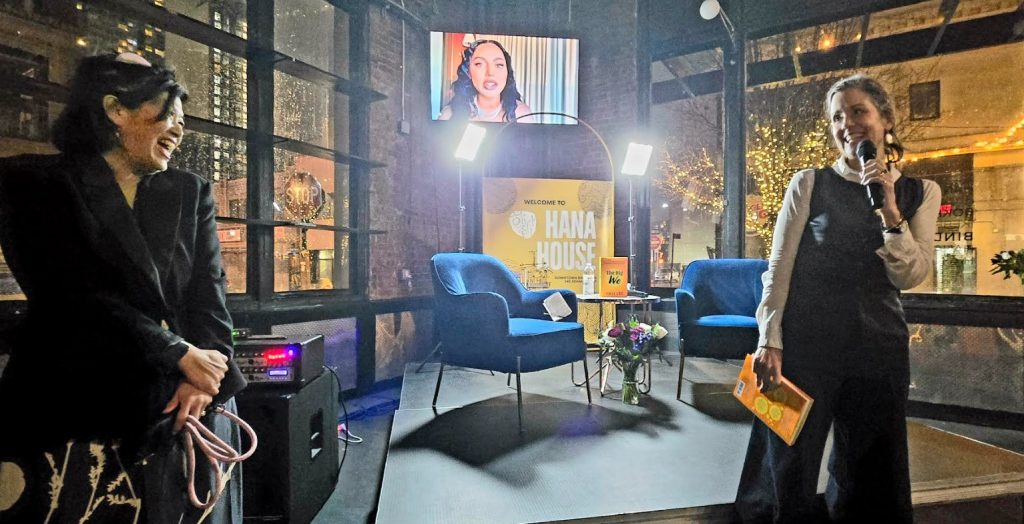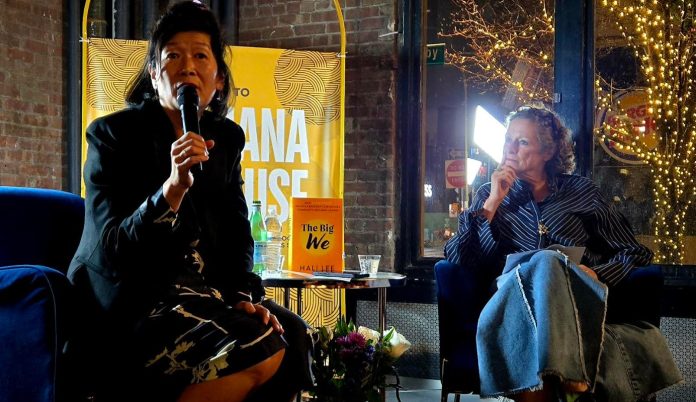By Randall Yip, Executive Editor
The Takeaways
- Collective Giving and Geh: Hali Lee emphasizes the power of collective giving through the Korean tradition of geh, where friends pool money together to support each other’s needs.
- This concept inspired her to co-found The Donors of Color Network and the Asian Women Giving Circle, which has contributed over $1 million to 80 art and culture organizations.
- From “Me” to “We”: Lee’s framework for philanthropy involves transitioning from individual efforts (“me”) to collective action (“we”), and ultimately to a broader community impact (“the big we”). Her book, The Big We, released by Sweet July, explores this philosophy.
The Details
When most think of philanthropy, billionaires such as Bill Gates or McKenzie Scott may come to mind.
But philanthropist Hali Lee wants to think bigger. She sees power in collective giving and the concept of geh. That’s a Korean tradition of friends pooling their money together and each month sharing it to fulfil a member’s need.
It’s from that concept that she co-founded The Donors of Color Network, the first national network of wealthy people of color and the Asian Women Giving Circle which has contributed over 1 million dollars to support 80 art and culture organizations.
“A framework that I like to use in my work is going from me to we-to the big we,” she proclaimed to AsAmNews.
Thus her book, The Big We, released this month by Sweet July, a lifestyle brand founded by celebrity chef and entrepreneur Ayeesha Curry.
The “me” is not something Lee dismisses. She sees “me” as the first step towards “we.”
For this Brooklyn woman from Korea, her “me” started with her grandfather who
“was a freedom fighter on whose shoulders I do this work.”
“He was jailed, imprisoned, and nearly killed by the Japanese Imperial army, and then, five short years later, taken away, forcibly marched by what became the North Korean army, and never heard from again- leaving my grandmother to raise her six children alone, and everyone in Korea who survived became a refugee.”
Lee immigrated from Seoul to the United States in the late 60’s at such a young age she considers herself a “tourist” whenever she returns to her home country. She is firmly grounded in her Korean American roots and by the racism she endured as a young child growing up in a suburb of Kansas City, MO.
She and her brother were the only Asian kids in their public school until Kim Wong came in the 5th grade. Hali and Kim remain friends today.
“Literally every year something awful would happen,” she recalled. “It was like the Chinese, Japanese taunt or someone would yell at us to go back where we came from or tell us to move to the back of the bus or comment how funny our house smelled, all the little things, big and small, that happen to us when we grow up in places where we’re not, I guess, the norm or the majority.”

With that as a backdrop, one comes to understand how she dipped her toes into philanthropy as the executive director of a Korean American domestic violence service provider in Queens.
“Then through a series of turns, I ended up trying to organize more of the wealth resource side to flow to that side of the table. I would say that early on the Asian Women Giving Circle, we were told explicitly, we did not belong in philanthropic rooms. I wasn’t even allowed to join.”
She sees the current state of philanthropy dominated by what she calls “Big Phil.” Phil isn’t the name of an individual, but short for philanthropy.
Lee instead wants philanthropy to move to the “big we.” That’s something she feels can happen if we pool our “time, talent and treasures” to build the future we want for our kids.
“I think it’s important for all of us who live in America to think about what we can do as individuals, to harness our own communities, values powers in order to make the change affect the change that we can make for me. I’m looking really locally.
For Lee, her home community is Brooklyn. She says it’s in our local communities where we can make the biggest impact.
It’s where she believes we can get out of the shadow of the “billionaire-dominant philanthropy” and reconnect with our roots of generosity and community care.
“The question we need to answer is where can I bring people to the table in order to have conversations around money and values in order to make the change that we can make?”
10% of your purchase price when buying through the links in this story will be donated to Asian American Media Inc, our non-profit arm.
AsAmNews is published by the non-profit, Asian American Media Inc.
We’re now on BlueSky. You can now keep up with the latest AAPI news there and on Instagram, TikTok, Facebook, YouTube and X.
We are supported by generous donations from our readers and by such charitable foundations as the Robert Wood Johnson Foundation.
You can make your tax-deductible donations here via credit card, debit card, Apple Pay, Google Pay, PayPal and Venmo. Stock donations and donations via DAFs are also welcomed.

